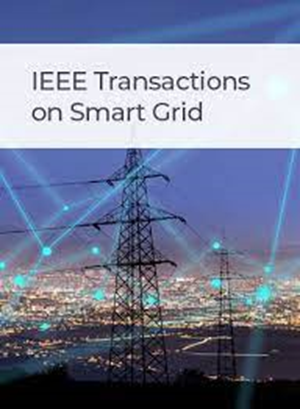Implicit Enhanced Distributed Heavy-Ball Energy Management Strategy for Microgrids With Time-Varying Social Welfare and Delay
IF 8.6
1区 工程技术
Q1 ENGINEERING, ELECTRICAL & ELECTRONIC
引用次数: 0
Abstract
Diverse energy sources and fluctuating energy demands highlight the criticality of microgrid energy management (MEM). This paper develops a general model of social welfare maximization in the presence of time-varying social welfare with quadratic transmission losses, which implies that the fitting coefficients of the transmission losses, cost function, and utility function may vary over time. A significant difference with existing works is the dependence of the problem’s optimal solution on time variation, making higher requirements on the algorithm’s performance, especially the convergence rate. To address these challenges, we extend the conventional heavy-ball method and propose a novel implicit enhanced distributed heavy-ball algorithm. The algorithm incorporates multiple heavy-ball terms to accelerate convergence. Notably, the second heavy-ball term is implicitly implemented via an acceleration term that contains historical information and consensus error. Furthermore, the algorithm obviates the necessity for the sharing of additional auxiliary variables, thereby reducing the communication overhead. We demonstrate that the algorithm converges asymptotically to the neighborhood of the time-varying optimal solution even with arbitrarily large but bounded communication delays. Finally, detailed case studies illustrate that the algorithm can improve the convergence rate by 15.02% over conventional method, followed by the validation of its scalability and the discussion of the negative impact of delay.具有时变社会福利和延迟的微电网隐式增强分布式重球能量管理策略
能源来源的多样化和能源需求的波动凸显了微电网能源管理的重要性。本文建立了具有二次型传递损失的时变社会福利的一般社会福利最大化模型,该模型表明传递损失、成本函数和效用函数的拟合系数可能随时间变化。与现有工作的显著区别在于问题的最优解对时间变化的依赖性,这对算法的性能,特别是收敛速度提出了更高的要求。为了解决这些问题,我们扩展了传统的重球方法,提出了一种新的隐式增强分布式重球算法。该算法通过引入多个重球项来加快收敛速度。值得注意的是,第二个重载项是通过包含历史信息和一致性错误的加速项隐式实现的。此外,该算法避免了额外的辅助变量共享的必要性,从而减少了通信开销。我们证明了该算法在任意大但有界的通信延迟情况下渐近收敛于时变最优解的邻域。最后,详细的实例研究表明,该算法的收敛速度比传统方法提高了15.02%,随后验证了其可扩展性并讨论了延迟的负面影响。
本文章由计算机程序翻译,如有差异,请以英文原文为准。
求助全文
约1分钟内获得全文
求助全文
来源期刊

IEEE Transactions on Smart Grid
ENGINEERING, ELECTRICAL & ELECTRONIC-
CiteScore
22.10
自引率
9.40%
发文量
526
审稿时长
6 months
期刊介绍:
The IEEE Transactions on Smart Grid is a multidisciplinary journal that focuses on research and development in the field of smart grid technology. It covers various aspects of the smart grid, including energy networks, prosumers (consumers who also produce energy), electric transportation, distributed energy resources, and communications. The journal also addresses the integration of microgrids and active distribution networks with transmission systems. It publishes original research on smart grid theories and principles, including technologies and systems for demand response, Advance Metering Infrastructure, cyber-physical systems, multi-energy systems, transactive energy, data analytics, and electric vehicle integration. Additionally, the journal considers surveys of existing work on the smart grid that propose new perspectives on the history and future of intelligent and active grids.
 求助内容:
求助内容: 应助结果提醒方式:
应助结果提醒方式:


